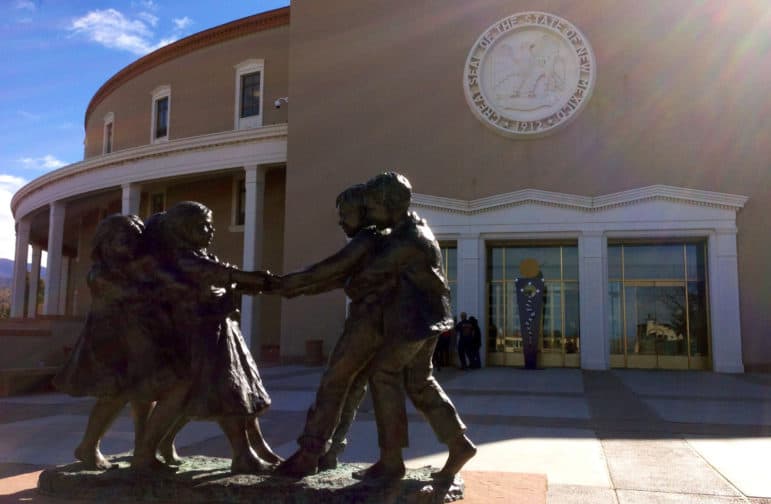
Heath Haussamen / NMPolitics.net
A statue outside the Roundhouse in Santa Fe.
Gov. Susana Martinez’s proposal to take money set aside for state lawmakers’ retirements to address a budget shortfall is unconstitutional, the agency that manages the fund says.
That’s because in 1998, voters approved an amendment to the N.M. Constitution stating that public employees’ retirement funds exist “for the sole and exclusive benefit of the members, retirees and other beneficiaries of that system.”
“A system trust fund shall never be used, diverted, loaned, assigned, pledged, invested, encumbered or appropriated for any other purpose,” the Constitution states.
“We believe it is unconstitutional,” Wayne Propst, executive director of the state Public Employees Retirement Association of New Mexico (PERA), said of the governor’s proposal.
A Martinez spokesman said that assertion is “absurd.”
“The fact is that legislators are jealously guarding their nest egg – which is one of the most generous in the country – while asking New Mexicans pay $350 million in tax increases, including on cars and gas,” Mike Lonergan said.
In January, Martinez proposed taking $12.5 million from the retirement fund to help balance the budget. At the time, the PERA presented a legal analysis to the Legislative Finance Committee. The “plain language” in the Constitution “unambiguously prohibits the proposed ‘sweeping’ of funds from the Legislative Retirement Fund,” that analysis states.
In addition, the analysis states, taking money from the fund “potentially jeopardizes PERA’s status as a qualified governmental plan under the Internal Revenue Code, and would violate the fiduciary duties of the PERA Board and principles of trust law that apply to PERA because trust fund monies must be used only for the exclusive benefit of members.”
Policymakers are locked in a battle over making additional cuts and fund sweeps or raising taxes to address a budget shortfall. With bipartisan support in the Senate but only Democratic support in the House, the Legislature approved raising various taxes and fees earlier this year to generate $350 million in new revenue to help fund the state budget. Martinez vetoed the tax bill and all funding for the Legislature and higher education for the fiscal year that begins July 1.
The Legislative Council is suing the governor to try to undo the vetoes of higher education and legislative funding. The N.M. Supreme Court is scheduled to hear arguments in that case on Monday.
Meanwhile, the governor has called a special session of the Legislature for May 24 at noon. She is reiterating her pledge to not raise taxes and once again calling for taking money from the legislative retirement fund — but the plan she’s proposed wouldn’t fully balance the budget.
And if lawmakers are successful in reversing the higher education and legislative vetoes, without the tax bill or other legislation the state will still face a budget shortfall come July 1.
New Mexico’s state lawmakers are the only in the nation who don’t receive a salary, but they can earn a retirement just like state employees. To help address a budget shortfall in 2016, lawmakers and the governor reduced the amount of money being put into the legislative retirement fund from $200,000 per month to $75,000. That cut state contributions to the fund from $2.4 million annually to $900,000.
But that’s different than taking money that’s already been placed into the fund, which is what the PERA says is unconstitutional.